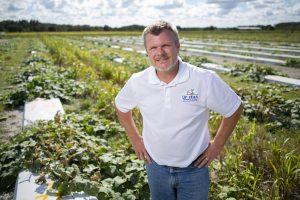UF Scientist Wins National Award for Program Connecting Military Personnel to Ag Careers
by BRAD BUCK, UF/IFAS
A veteran himself, University of Florida plant pathologist Gary Vallad wanted to give back to his comrades-in-arms. So, he and Simon Bollin started the Veterans Florida Agriculture Program (VFAP), which helps train veterans for jobs in that field.
In 2017, Bollin, agribusiness development manager for UF/IFAS Extension Hillsborough County, contacted Vallad. What started at the Gulf Coast Research and Education Center (GCREC) is now a statewide program.
“I couldn’t say no. The opportunity just made sense,” says Vallad, a faculty member at the GCREC, also in Hillsborough County. “As a former member of the Army National Guard, I leaped at the opportunity to give back to a cherished part of my past. My relationship with the countless veterans and active military personnel I’ve had the pleasure of working with has been one of my greatest personal rewards.”
For his work with VFAP, Vallad has been selected for the 2023 USDA-NIFA Partnership Award for Mission Integration or Research, Education or Extension. He received the award May 15.
More than 110 veterans have graduated from the program, all of them have had job offers in agriculture and 85% have accepted a career in agriculture.

“Gary and I developed the program, and since then, he has promoted it within UF/IFAS and managed the interns at GCREC,” Bollin says. “This is probably one of the most successful veteran transition programs in the country and definitely within agriculture.”
The program started with Michael Burrell who, after retiring from a 28-year career in the U.S. Air Force, was given hands-on training in agriculture at GCREC. After graduating from the GCREC program, Burrell took a job as an intern at Farm Credit of Central Florida.
VFAP is a six-month program, with veterans rotating through the various research programs. Vallad set up the rotations at GCREC with the center’s scientists. Bollin and Amy Dudley, project director at Veterans Florida, work with local veterans groups to find candidates and industry partners for the veterans to work post internship.
Vallad and Bollin partnered with Dudley because that group already had the resources and connections to take VFAP to the state level. From there, they got a USDA grant to train veterans.
Vallad administered the award through UF/IFAS, which let the veterans group take the program to RECs statewide – from Milton to Homestead.
The West Florida REC in Milton – near Pensacola — and GCREC, near Tampa — are the busiest sites for the program. Bollin attributes their high enrollments to each center’s close proximity to large military installations and excellent on-site management.
In addition to expanding across the state, VFAP now includes active-duty service members by working with the Department of Defense SkillBridge program.
“This doubled the amount of military personnel served per year and is recognized in all 50 states and globally as a unique opportunity in agriculture for transitioning service members,” according to the NIFA award nomination form submitted by Dudley.
Currently, VFAP is limited to active military members through SkillBridge, although the program is actively looking for sources to fund veterans, Vallad says.
“(The program) is something I want to keep going and hopefully find additional opportunities with the planned Center for Artificial Intelligence in Agriculture at GCREC,” Vallad says.
Most programs that help transition veterans to careers in agriculture try to help them land jobs in production agriculture, Bollin says.
“Although a noble cause, production agriculture is a risky business and with no land, no equipment, little money or experience in agriculture, it was making a difficult task almost impossible for these veterans,” he says. “So, Gary and I developed a hands-on, paid, rapid and diverse internship program at GCREC that would get veterans up to speed on agricultural practices so they could successfully transition to a career in agriculture.”
If they wanted to eventually get into production agriculture, the veterans would have the agricultural experience, local resources and a steady income to make a successful transition into farming.
“VFAP has been an amazing success, not only from an employer perspective but also in veteran career development and in offering veterans a career with purpose and community,” Bollin says. “VFAP participants are successfully transitioning from a career providing national security to a career providing food security.”

